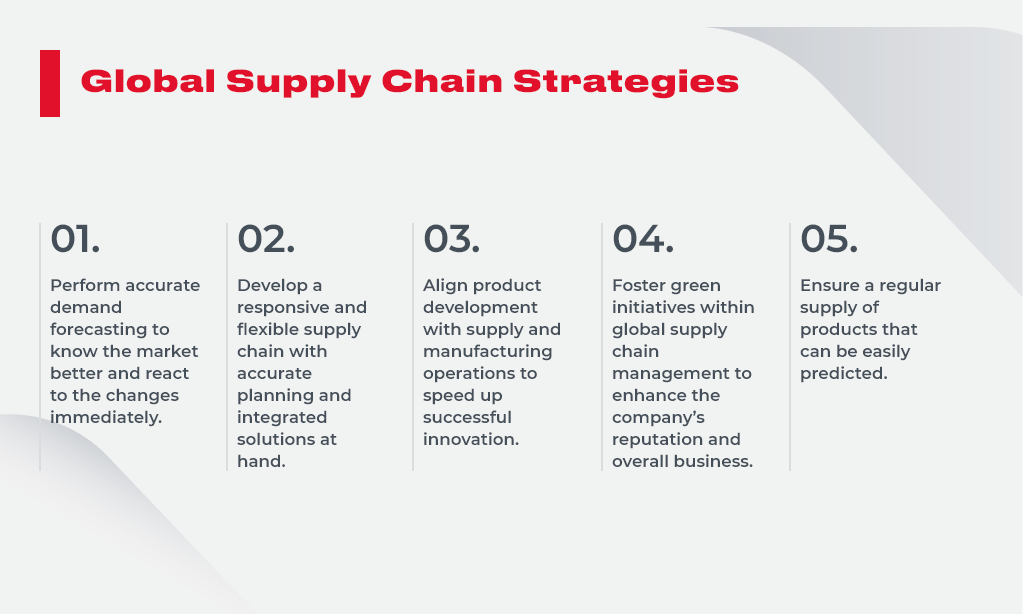
Navigating Global Supply Chains: Strategies for Success

Navigating Global Supply Chains: Strategies for Success
The realm of global supply chain management is complex and dynamic, requiring businesses to employ robust strategies for success. In this article, we delve into the intricacies of managing global supply chains, exploring key challenges, effective strategies, and the role of technology in optimizing operations.
Understanding the Complexity of Global Supply Chains
Global supply chains encompass a vast network of suppliers, manufacturers, distributors, and logistics providers across different countries and continents. The complexity arises from diverse regulatory environments, cultural nuances, and varying market conditions. Navigating these complexities is essential for businesses seeking to establish resilient and efficient global supply chains.
Challenges in Global Supply Chain Management
Managing a global supply chain presents numerous challenges. These include geopolitical uncertainties, trade restrictions, currency fluctuations, and the need for compliance with diverse regulations. Additionally, long lead times, transportation complexities, and cultural differences further contribute to the intricacies of global supply chain management. Businesses must identify and address these challenges strategically to ensure a smooth and efficient supply chain.
Risk Mitigation Strategies in Global Supply Chains
Effective risk mitigation is integral to the success of global supply chains. Businesses need to implement proactive strategies to identify, assess, and mitigate risks. This includes diversifying suppliers, utilizing advanced analytics for predictive risk management, and establishing contingency plans. By prioritizing risk mitigation, businesses can enhance the resilience of their global supply chains in the face of unforeseen challenges.
Embracing Technology for Visibility and Connectivity
Technology plays a pivotal role in navigating global supply chains. Advanced analytics, artificial intelligence, and blockchain technology provide unprecedented visibility and connectivity across the supply chain. These technologies enable real-time tracking of shipments, optimize inventory management, and enhance communication and collaboration among supply chain partners. Embracing technology is key to achieving transparency and efficiency in global supply chain operations.
Strategies for Efficient Global Logistics
Logistics is a critical component of global supply chain management. Implementing efficient logistics strategies involves optimizing transportation routes, leveraging technology for route planning, and utilizing advanced warehousing solutions. Moreover, businesses can explore partnerships with global logistics providers to streamline operations and improve the overall efficiency of their supply chains.
Collaboration and Communication Across Borders
Effective collaboration and communication are paramount in global supply chain management. Clear communication channels and collaboration platforms facilitate seamless interaction among supply chain partners. This is particularly crucial when dealing with diverse stakeholders across borders, ensuring that everyone involved is aligned with the overall supply chain objectives.
Sustainable Practices in Global Supply Chains
Sustainability has become a central focus in global supply chain management. Adopting sustainable practices not only aligns businesses with global environmental goals but also contributes to long-term supply chain resilience. This includes sourcing materials responsibly, reducing carbon footprints in transportation, and promoting ethical labor practices throughout the supply chain.
Agility and Flexibility for Adaptability
Agility and flexibility are essential attributes for successful global supply chain management. Businesses need to be adaptable to changes in market conditions, customer demands, and unforeseen disruptions. Developing agile supply chain




:max_bytes(150000):strip_icc()/open-septic-tank-in-yard-while-bring-pumped-out-174030025-b87921a99e5748fb9997eebf4b203f3b.jpg)
